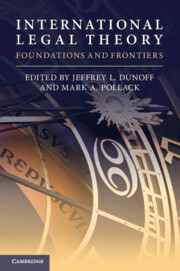Book contents
- International Legal Theory
- Reviews
- International Legal Theory
- Copyright page
- Contents
- Contributors
- Acknowledgments
- Part I Introduction: Setting the Stage
- Part II Traditional Approaches to International Law
- Part III Critical Approaches to International Law
- Part IV Post–Cold War Approaches to International Law
- Part V Interdisciplinary Approaches to International Law
- Part VI International Law: Dialogue and Dialectic
- 15 Reflections on International Legal Theory and Practice: A Conversation with Georges Abi-Saab
- 16 Theory and Practice: Two Sides of the Same Coin
- 17 International Legal Theory: A Dialogic Conclusion
- Index
17 - International Legal Theory: A Dialogic Conclusion
from Part VI - International Law: Dialogue and Dialectic
Published online by Cambridge University Press: 21 July 2022
- International Legal Theory
- Reviews
- International Legal Theory
- Copyright page
- Contents
- Contributors
- Acknowledgments
- Part I Introduction: Setting the Stage
- Part II Traditional Approaches to International Law
- Part III Critical Approaches to International Law
- Part IV Post–Cold War Approaches to International Law
- Part V Interdisciplinary Approaches to International Law
- Part VI International Law: Dialogue and Dialectic
- 15 Reflections on International Legal Theory and Practice: A Conversation with Georges Abi-Saab
- 16 Theory and Practice: Two Sides of the Same Coin
- 17 International Legal Theory: A Dialogic Conclusion
- Index
Summary
It is the nature of all law books, and edited books in particular where authors are constrained in the space available to them, that oftentimes readers, if they could, would love to put a question, seek a clarification, or even contest one or more propositions in what they read.
My role here is to be a “Consul of the Readers” and to put such questions to some of the contributors to this excellent volume. The book is interesting and timely: finding side by side an array of different theory approaches to international law. The authors did not have the benefit of seeing the whole when writing their specific contributions – and maybe only few readers will take the time to read the book cover to cover. My questions to the various authors are, however, informed not only by the specific contributions but by the perspective of seeing the individual trees and the forest as a whole.
- Type
- Chapter
- Information
- International Legal TheoryFoundations and Frontiers, pp. 361 - 426Publisher: Cambridge University PressPrint publication year: 2022

